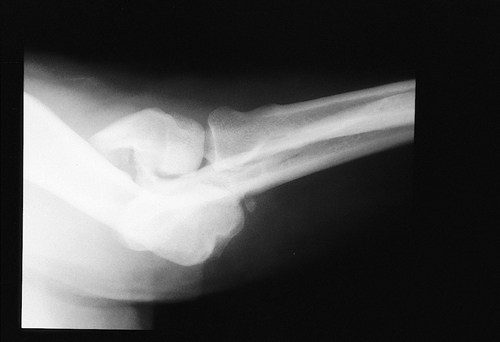Difference between revisions of "Small Animal Orthopaedics Q&A 06"
(No difference)
| |
Latest revision as of 16:27, 24 October 2011
| This question was provided by Manson Publishing as part of the OVAL Project. See more Small Animal Orthopaedics Q&A. |
A craniocaudal view radiograph of the left elbow of a six-year-old, male Cocker Spaniel that developed an acute non-weight-bearing lameness of the left forelimb while chasing a ball in the owner’s yard.
| Question | Answer | Article | |
| Describe the fracture. | There is an intra-articular fracture of the lateral portion of the left humeral condyle (capitulum) extending through the lateral epicondylar crest. The capitulum is displaced proximally. |
Link to Article | |
| Why are Spaniels predisposed to this particular injury, often as a result of minor trauma? | It has long been recognized that fractures of the humeral condyle often occur with minimal trauma and that humeral condylar fractures frequently occur in Spaniels. A developmental defect of the humeral condyle termed ‘incomplete ossification’ has been described in Spaniels. As the humeral condyle mineralizes in puppies, the two (capitulum and trochlea) ossification centers should unite at 70 ± 14 days after birth. Their bone architecture should become continuous. In Spaniels the connection between the lateral and medial portions of the humeral condyle may be purely fibrous and contain little or no bone. This weak connection predisposes the condyle to fracture with minimal trauma. |
Link to Article | |
| What is the prognosis for repair and
possible complications? |
The fracture should be anatomically reduced and stabilized with a transcondylar screw placed in lag fashion. In this dog, additional screws were placed in the epicondylar region to provide adjunctive stability. This fracture may not heal because the lateral and medial portions of the condyle were never united. Therefore, the lag screw must provide rigid stabilization for a prolonged period of time. In one case series, 23% of dogs had complications following surgical repair of condylar fractures. The screw may loosen, resulting in pain, or break, resulting in failure of stabilization. When possible, a 4.5 mm cortical bone screw should be selected as this screw has 2.5 times the resistance to bending when compared with a 3.5 mm cortical screw. The contralateral condyle should also be evaluated. If incomplete ossification is present, the potential for fracture of the contralateral condyle exists. |
Link to Article | |
